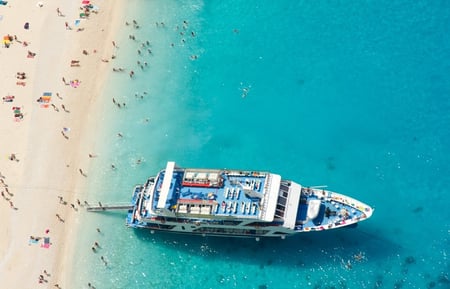The Comeback of the Cruise
By Nick Ostdick on May 3, 2016 9:44:37 AM

Ask any number of travel industry insiders and they’ll all tell you the same thing: Cruises are back.
According to a recent poll by Cruise Line International Association, 83 percent of the group’s agents expect to see sharp increases in cruise packages sales throughout the rest of 2016 and beyond. In addition, 77 percent expect travelers will spend more money on cruise packages this year than in 2015. 
But what’s even more staggering is that 24 million people are expected to take a cruise of some manner during 2016 - a huge increase from just 15 million in 2006. That jump equates to the cruise sector clocking in at a $119 billion industry, a figure which is only expected to rise as cruise lines expand into new and emerging markets such as Asia, Cuba, and others.
Cruise lines have responded to this influx of interest by broadening their services and tailoring their dining, entertainment, relaxation, and cultural offerings to a wide variety of travelers - baby boomers, millennials, luxury, and even adventure travelers. Cruise lines have also placed greater emphasis on promoting more domestic destinations - 73 percent of agents have reported increases in Alaskan cruise bookings, while 42 percent have experienced increases in Canadian and New England-based cruises.
But as with any travel industry trend, the question that must be asked is: Why? Why the sudden resurgence in cruises, especially given the cost of international travel has been on the decline for several years? Why the renewed interest when millennials - one of the driving customer segments in today’s travel industry - have turned away from static, packaged vacations in favor of dynamic, unique travel experiences?
To help us understand this, here are 5 reasons for the comeback of the cruise.
Introduction of Asian Markets
According to the CLIA, the growth and expansion in Asian markets has been a core driver in repopularizing the cruise as a destination or vacation option. As recently as five years ago, cruise travel was almost unthinkable in Asia, and cruise lines devoted little time, resources, and effort to positioning themselves in that market. However, today Asia is one of the fastest growing - if not the fastest growing - market for cruises across the globe. The CLIA reports passenger volume grew from 775,000 in 2012 to nearly 1.4 million in 2014, and as such cruise lines are heavily investing in the Asian market by catering cruise experiences to the principles of that culture to make travelers feel as at home as possible.
Making Ships a Destination
Cruises used to be conceived as somewhat of a contained travel experience - ships offered a select number of activities and recreation options, but more or less being on the ship itself was thought of as the main driver for travelers in choosing a cruise over a different method of travel. However, today’s cruise vacation offers travelers much more than expansive vistas of the ocean. Most cruise ships offers passengers a wealth of entertainment options such as productions of Broadway shows, classes or demonstrations, recreation and fitness activities, robust dining options, and even activities for thrill-seeking travelers such as rock wall climbing, ziplines and more. No longer is a passenger expected to simply lounge about on the deck while working on their tan - many cruise lines have reimagined what it means to cruise in the 21st Century.
Embracing Local Cultures
As we mentioned earlier, cruise lines have suffered recently because one of today’s core consumer base - millennials - have eschewed the packaged nature of cruises for fully immersive cultural experiences - why spend a few days trapped on a boat sailing passed islands when you can go to the island itself and experience new places and people? But with day excursions and multiple-night stay overs, cruise lines are now offering travelers the ability to experience new cultures while still providing the amenities and comfort of the traditional cruise. Travelers get to tailor how immersive they want their experiences to be and can opt in or out of excursions that best fit their style.
Intergenerational Traveling
Intergenerational traveling used to mean cramming the kids, mom, dad, grandma, and grandpa into the family station wagon and setting out on a long road trip to the Grand Canyon - but not today. With more and more baby boomers spending money on luxury travel destinations, cruises have become the modern version of the station wagon where generations of families come together to experience travel. Given the breadth of amenities available on today’s cruise ships, each generation of the family can engage in a variety of customized activities at their own pace on their own time. Cruise lines who leverage this trend in travel have seen robust ROI and increase bookings as families seek ways to experience the world together as a unit.
Staying Connected
Let’s face it: In today’s global, digitally-interconnected world, it’s very difficult to completely unplug, even when you’re on vacation. Most travelers still check email and social media sites while enjoying leisure activities during a vacation or trip. To accommodate this, many cruise ships now offer free Wi-Fi, business centers, and other methods to incorporate technology from our daily lives into our vacation lives. Providing customers with the ability to stay grounded and connected to their non-traveling lives offers a peace of mind they cannot achieve through other ways of traveling - you’re on the high seas experiencing different cultures, but you’re still connected to the office in case of emergencies.
How the cruise industry will leverage the renewed interest in its products and services is unclear - all we know is that for the foreseeable future, cruise lines are expected to rebound from recent downturns to become a vital sector of the travel industry. But one can only believe that with additional advancements in technology, the scope of the activities cruise lines can offer passengers, and further expansion of new markets, cruising will remain a viable travel option for a wide variety of consumers.
Online reputation management strategy is crucial for travel marketing. Download our free eBook and find out how to improve your online reputation.
- travel technology (60)
- Travel Industry (49)
- travel agency (31)
- travel erp (31)
- travel trends (28)
- travel booking system (23)
- TINA (21)
- travel company (19)
- Tour Operator (18)
- Product updates (17)
- Travel Management Company (17)
- AIDA (15)
- TBS (15)
- Business Travel (14)
- dcs plus news (14)
- tour operator solution (14)
- travel website (14)
- travel erp system (13)
- Mobile App (12)
- Travel App (12)
- mid back office solution (12)
- trends (12)
- Corporate Travel (11)
- Industry Events (11)
- Mobile Technology (11)
- TMC (11)
- travel agents (11)
- erp (10)
- erp system (10)
- Tour Operators (9)
- Travel booking engines (9)
- dcs plus (9)
- online travel agency (9)
- travel agent (9)
- Mobile Bookings (8)
- travel (8)
- travel agencies (8)
- 2017 (7)
- Business Traveler (7)
- Mobile Travel (7)
- travel business (7)
- travel software (7)
- Digital Technology (6)
- Insider (6)
- Millennials (6)
- Online booking systems (6)
- Travel Management Companies (6)
- process automation (6)
- travel companies (6)
- Big Data (5)
- Partners interviews (5)
- Tour Operator Software (5)
- customer retention (5)
- travel agency technology (5)
- Booking engines (4)
- CSBT (4)
- Mobile Device (4)
- Mobile travel apps (4)
- OTAs (4)
- Static databases (4)
- Tour Companies (4)
- Travel Policy (4)
- Travel booking systems (4)
- Travel suppliers (4)
- back office automation (4)
- corporate self booking tool (4)
- millennial travelers (4)
- online travel (4)
- responsive travel website (4)
- technology (4)
- travel website conversion (4)
- 2016 (3)
- Content mapping (3)
- Databases (3)
- Demographics (3)
- Food and Adventure Tourism (3)
- Mobile Apps (3)
- Travel Distribution Channels (3)
- Travel Management Software (3)
- Travel customers (3)
- Travel history (3)
- anniversary (3)
- automated processes (3)
- content matching (3)
- global travel industry (3)
- social media (3)
- travel agency workflow (3)
- travel back office (3)
- travel marketing (3)
- travel process automation (3)
- AI in travel (2)
- Advanced Booking Systems (2)
- B2B Travel Resellers (2)
- Bleisure (2)
- Branding (2)
- Business Process Automation (2)
- Business Travelers (2)
- Customer engagement (2)
- Financial Reporting (2)
- Food Tourism (2)
- Inbound Marketing (2)
- Infographic (2)
- Leisure Travel (2)
- Saas (2)
- Templates (2)
- Travel Costs (2)
- Travel bookings (2)
- Travel start-up (2)
- Travel website abandonment (2)
- WTM 2016 (2)
- abandoned travel bookings (2)
- engagement marketing (2)
- internet booking engine (2)
- millennial traveler (2)
- new travel company (2)
- office (2)
- online reputation management (2)
- online travel reviews (2)
- reporting (2)
- software (2)
- start-up tips (2)
- travel agency management (2)
- travel agency website (2)
- travel experience (2)
- travel mobile app (2)
- travel packages (2)
- travel reservation system (2)
- travel system (2)
- travelers (2)
- web-based travel erp (2)
- 2020 (1)
- 360 Customer View (1)
- Advanced Accommodation Contract Management (1)
- Adventure travelers (1)
- Apps (1)
- B2B Reseller (1)
- B2B Resellers (1)
- B2C (1)
- BI Reporting (1)
- Budget traveler (1)
- Cancellations (1)
- Chat (1)
- Chinese millennial (1)
- Cloud (1)
- Cognitive computing (1)
- Comparison shopping (1)
- Conference (1)
- Contact matching (1)
- Content (1)
- Cruise (1)
- Culinary traveler (1)
- Customer relations (1)
- Digital Innovation (1)
- Digital Natives (1)
- Documents (1)
- Emerging market travelers (1)
- Emerging markets (1)
- Errors (1)
- Experimental travel (1)
- Financial Dashboard (1)
- Import rates (1)
- Instant messaging (1)
- Integrate with Accounting Software (1)
- Internet (1)
- Luxury traveler (1)
- Mobile Transaction (1)
- Mobile payments (1)
- NDC distribution (1)
- Operational Reporting (1)
- Reseller networks (1)
- Resellers (1)
- Response (1)
- Subagents Network (1)
- TINA Academy (1)
- TTE (1)
- Travel Reseller Network (1)
- Travel Revenue Management (1)
- Travel booking problems (1)
- Travel finance reporting (1)
- Travel stats (1)
- WTM (1)
- abandonment (1)
- accomodations (1)
- advanced reporting (1)
- airline direct connect technology (1)
- ancillary services (1)
- cloud computing (1)
- collection (1)
- collection challenges (1)
- common data model (1)
- conversion rates (1)
- corporate mobile app (1)
- cost control (1)
- credo ventures capital invests in dcs plus (1)
- customer reviews (1)
- data analysis (1)
- dcs plus credo investment (1)
- dcs plus credo ventures (1)
- deloitte technology fast 500 EMEA (1)
- digital transformation (1)
- e-invoicing KSA (1)
- email marketing (1)
- email marketing for OTAs (1)
- erp e-invoicing (1)
- lost travel bookings (1)
- modern travel agencies (1)
- networks (1)
- new features (1)
- offers (1)
- online customer review (1)
- online reputation (1)
- online travel agencies (1)
- risk management (1)
- sales (1)
- senior travelers (1)
- shopping baskets (1)
- shopping carts (1)
- social network (1)
- standardized processes (1)
- static content (1)
- travel SaaS (1)
- travel account services (1)
- travel agency customers (1)
- travel agency profitability (1)
- travel analytics (1)
- travel blog (1)
- travel planning (1)
- travel reviews (1)
- travel shopping carts (1)
- travel software for agencies (1)
- travel software system (1)
- travel technology europe (1)
- travlist smart mobile app (1)
- trend (1)
- trusted adviser (1)
- trusted advisor (1)
- upsell functionality (1)
- vouchers (1)
- website traffic (1)
- zatca (1)
Subscribe by email
You May Also Like
These Related Stories

4 Reasons Why Millennials Are Taking Over Corporate Travel

The 3 E’s: Why Millennials Are Turning to Travel Agents


No Comments Yet
Let us know what you think